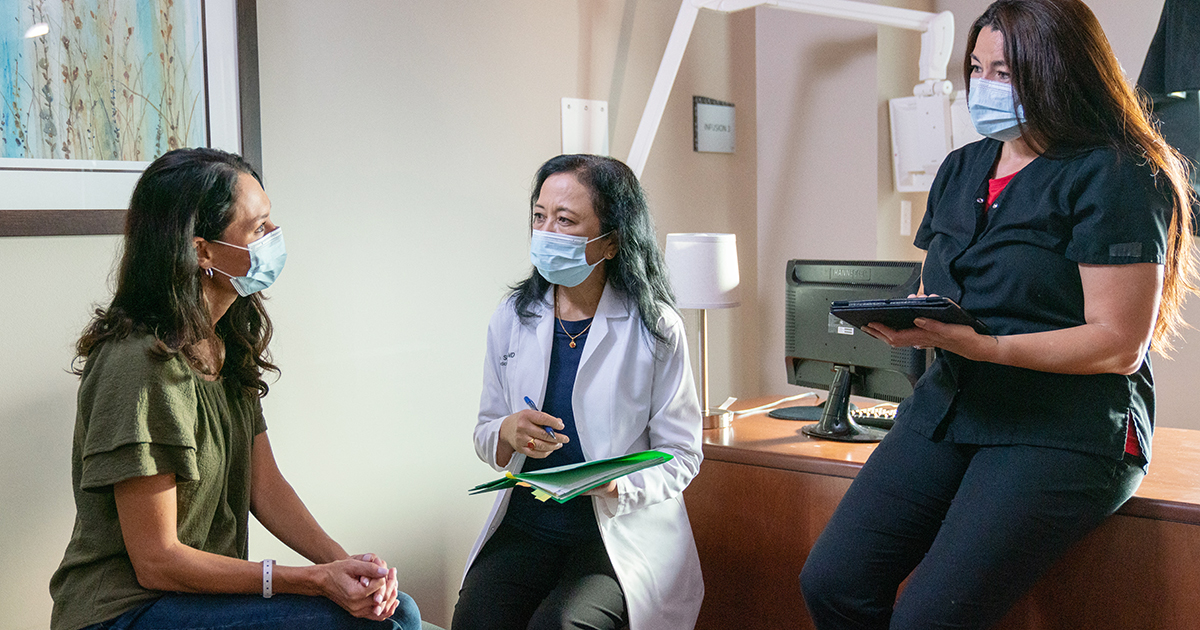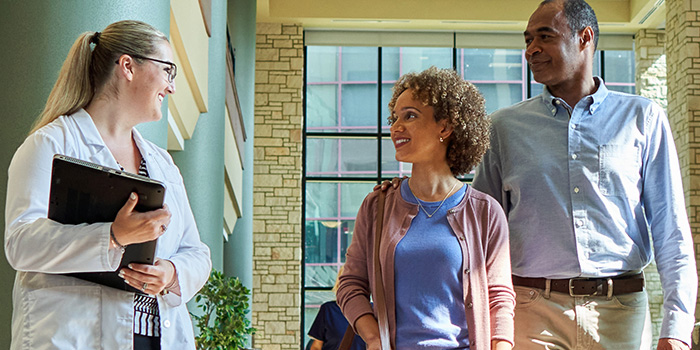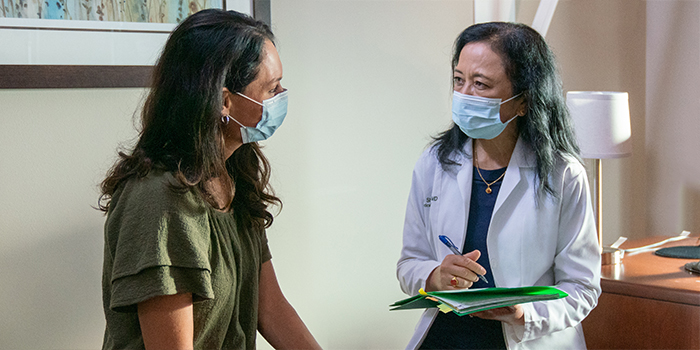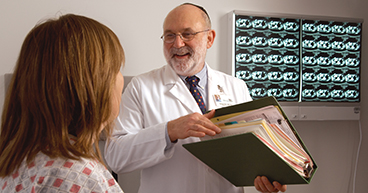
Approximately 4 million women in the United States are living with a history of breast cancer, according to the American Cancer Society. If you’re one of them, you already know how much anxiety comes with a breast cancer diagnosis.
If you’re newly diagnosed, you may have a lot of questions about breast cancer in general, but of course, you’re most concerned about the specifics of your diagnosis: What stage is your cancer? Is your tumor invasive or non-invasive? What kind of treatment will you need and how long will it last? How will you manage any side effects? A second opinion may help you gain more certainty about the answers to these and other questions.
Debunk this breast cancer second opinion myth
A common misconception about getting a second opinion for breast cancer is thinking you don’t have time for it. It’s natural to want to begin treatment as soon as possible after a diagnosis. You may fear that your cancer will spread during the time it takes to get one. However, in most cases—not all—this is not true.
In fact, the potential benefits of a second opinion are often well worth a short pause before beginning treatment. A retrospective study showed that after their cases were reviewed by a multidisciplinary tumor board (MTB), 43% of breast cancer patients who sought a second opinion had a change in diagnosis. Most often, the staging of the cancer changed slightly (up or down), but that change may affect treatment options.
Diagnostic tools and tests, along with treatment options, are rapidly evolving. Depending on your specific situation, a second opinion may give you access to genetic and genomic testing, surgical advances and precision medicine options like targeted therapy. These advances may offer you and your cancer treatment team treatment choices that have fewer risks and less severe side effects.
No matter where you are in your breast cancer journey, taking the time to get a second opinion may provide you with a more accurate diagnosis and access to innovative treatment options—not to mention peace of mind.
To help you determine if you should get a second opinion for breast cancer, we help you explore these essential topics:
- Reasons to get a second opinion for breast cancer
- How a second opinion may change your diagnosis and treatment options
- Where to get a second opinion
- How to prepare for an appointment for a second opinion
- What to expect at a breast cancer second opinion appointment
Many of our patients travel from another state to receive treatment at one of our locations across the United States. If you’d like to talk with someone on our team about getting a second opinion for breast cancer call us or chat online with us. We'd like the opportunity to listen, hear your concerns and answer your questions.
Reasons to get a second opinion for breast cancer
Getting a second opinion is a common practice. As a patient, you have the right to get a second opinion at any point during your cancer journey, for any reason that’s important to you. Most doctors won’t be surprised or offended that you want one. They may even encourage it and help you arrange it.
Many women initially struggle to understand the complexities of their diagnosis, and they want more information. Another oncologist may be able to explain your specific cancer type, stage and treatment options in a way you can better understand.
Verify a breast cancer diagnosis
Getting a second opinion immediately after your diagnosis may also validate the type and stage of your breast cancer. Knowing that your diagnosis is accurate and that you and your current doctor have chosen a treatment that’s right for you may help reduce your anxiety.
It’s not uncommon, however, for a diagnosis to change somewhat during a second opinion, often resulting in more accurate staging. Another pathologist or radiologist may catch something the first one missed. The facility where you get a second opinion may use more sophisticated breast cancer diagnostic tools, such as genetic and genomic testing, advanced imaging tests, additional procedures to get a more precise biopsy or some combination of these. A more precise diagnosis may reveal additional treatment options your doctor hadn’t previously considered.
Consider a new provider or treatment center
A second opinion may also be a way to evaluate a new provider or facility for your cancer care. Finding a provider you’re comfortable with is important because you may end up being with that oncologist for five or more years as your treatment journey progresses. If you’re unhappy with some aspect of your current care and you’re thinking of changing oncologists, a second opinion may be an option for you to consider. Or, maybe you’re looking for a medical center with a team of breast cancer experts who have access to comprehensive, advanced treatment options that are unavailable through your current care team. Getting a second opinion allows you a chance to interact with therapists and providers who’d be managing your care.
A second opinion later in treatment
Sometimes, women who’ve completed their breast cancer treatment seek a second opinion as well. They may want confirmation that the treatment they received was appropriate and that the plan for follow-up care is the correct course of action. Getting that confirmation often provides peace of mind.
If your cancer has come back, you may want to seek a second opinion about the recurrence. Science has evolved considerably over the last two or three years. You may now qualify for a clinical trial, or there may be new treatment options available for you now that weren’t available just a few years ago.
Reasons to delay a second opinion for breast cancer
On the other hand, you may want to delay getting a second opinion if you’re diagnosed with an aggressive form of cancer, such as inflammatory breast cancer. You may need to start treatment immediately and seek a second opinion later. You also may want to delay getting a second opinion if travel is difficult for you and/or you have no support system in place. In those cases, convenience may temporarily be the priority.
How a second opinion may change your treatment options

Treatment for breast cancer may include surgery, chemotherapy, radiation and/or some form of precision medicine, such as immunotherapy or targeted therapy. These therapies may be used in combination depending on your specific situation. At City of Hope, we also provide patients with access to supportive care therapies to help prevent and manage side effects of these and other cancer treatments.
Many women initially want the most aggressive form of treatment available for their type of breast cancer, believing this will improve their treatment outcome. They’re often surprised to find that this isn’t always recommended. The most aggressive form of treatment isn’t always necessary or even beneficial because patients may more easily tolerate innovative treatments that may have equal or better outcomes. A second opinion may help clarify some of these questions.
Take chemotherapy, for example. Genomic testing may determine whether a solid tumor is likely to respond to specific chemotherapy drugs. If chemotherapy is necessary, patients may be a candidate for oral chemotherapy or monthly injections instead of chemotherapy administered through an intravenous drip. Neoadjuvant (or primary systemic) breast cancer chemotherapy before surgery may improve the patient’s chances for having breast conservation surgery.
Two of the biggest areas where breast cancer treatment has changed during recent years involve surgery and precision medicine. A second opinion may reveal whether these advances would be appropriate for you.
Surgery for breast cancer
As a Breast Surgical Oncologist at City of Hope® Cancer Center Atlanta, I have seen many cancer patients who were initially told they had to have a mastectomy because they were young. Many others come in wanting a bilateral mastectomy, also known as a double mastectomy, because they mistakenly believe this offers them the best outcome and the best way to prevent a cancer recurrence. They’re unaware that research shows no increase in breast cancer survival rates for most women who undergo bilateral mastectomies for early-stage breast cancer. No one has told them that their cancer may still return after a mastectomy or that breast conservation therapy (lumpectomy) followed by radiation may be a safe option for them.
To be clear, a mastectomy is sometimes necessary. If you have cancer in multiple areas of the breast, a large tumor or certain genetic mutations, such as BRCA1 or BRCA2, your surgeon may recommend a mastectomy. Even then, however, advances in breast cancer surgery include nipple-sparing mastectomy and skin-sparing mastectomy, which may be options for you. Many surgeons today are also more skilled at reducing scarring from surgery.
If a mastectomy isn’t absolutely necessary, you and your oncologist should weigh the pros and cons of a mastectomy versus a lumpectomy. You may also choose to undergo breast reconstruction after a mastectomy, which usually involves multiple surgeries.
The recovery period after a mastectomy usually lasts two to three months versus a couple of weeks for a lumpectomy. You’ll most likely need radiation therapy after a lumpectomy to prevent cancer recurrence, but radiation has evolved, too. Women used to have to have radiation for six weeks after a lumpectomy, but now, 3.5 weeks may be sufficient. In some cases, there’s even the option to have surgery and radiation on the same day, followed by hormonal therapy for the next five to 10 years.
Precision medicine
If you’re a candidate, scientific advances in the field of precision medicine may help identify an appropriate targeted therapy to treat your breast cancer based on genetic mutations found in your tumor through advanced genomic testing.
Sometimes, newly diagnosed breast cancer patients confuse genetic testing and advanced genomic testing.
Genetic test results may reveal whether you were born with a gene mutation linked to an increase in the risk of developing certain cancers. The most common genetic mutations associated with increased breast cancer risk are found in the BRCA1 and BRCA2 genes. These genetic mutations are actually not as common as many women believe they are. Less than 10 percent of women diagnosed with breast cancer have an inherited genetic mutation. Genetic testing may be useful in assessing your risk of breast cancer recurrence.
Genomic testing may tell us what kind of treatment may be appropriate for your specific cancer. If you’re a candidate, the DNA of your tumor’s cancer cells is isolated and sequenced. Scientists use state-of-the-art lab equipment to look for genetic abnormalities that can be matched to drug therapies previously shown to be effective for that abnormality. This may open up new treatment options for you, since, if a matching therapy is found, it may not be one typically associated with treating breast cancer.
Genomic testing may also be useful in helping predict the likelihood of breast cancer recurrence, which also affects your treatment options. If you’re at low risk of recurrence, you may be a candidate for receiving hormone therapy for five or 10 years instead of chemotherapy. If you’re at high risk for recurrence, your oncologist may be more likely to recommend chemotherapy.
A note about breast cancer in men
About 1 percent of breast cancer diagnoses affect men. Men tend to be diagnosed with breast cancer at a later stage, possibly because they are less likely than women to assume that a lump in the breast may be breast cancer. However, if the cancer is found early, their survival rates are consistent with women’s. Men also tend to have higher rates of inherited gene mutations that may also put them at higher risk of prostate cancer. Treatment options for men with breast cancer are generally similar to those of women.
Where to get a second opinion for breast cancer

Deciding where to seek a second opinion may depend on what you’re seeking to gain from it. Are location and convenience most important to you? Do you value a personal recommendation? Or are you looking for a comprehensive cancer center with access to advanced diagnostic resources, breast cancer experts, innovative treatment options and other resources?
If a personal recommendation is important to you, your current oncologist or surgeon may recommend a provider, though your doctor may prefer you to stay within the same hospital system. Your insurance company may be able to provide you with a list of local, in-network oncologists or facilities.
Some patients ask for recommendations from friends and family members who’ve been treated for cancer, and they may even talk to friends of friends. Others search online. You may be able to use patient forums to find recommendations for providers who treat your specific breast cancer type. Some reputable cancer organization websites also offer resources to help patients navigate cancer care. The American Cancer Society website, for example, has a Directories of Healthcare Professionals page to assist oncology patients in their search for an oncologist. The National Cancer Institute and breastcancer.org also have helpful resources online.
Seeking a second opinion at a cancer center
If you’re searching for an oncologist who specializes in breast cancer and who has access to advanced technology, additional treatment options and other resources not available at many general hospitals, you’ll likely need to search for a high-volume facility that focuses only on oncology. These centers usually have higher levels of accreditations that require them to comply with certain standards and practices. At our Breast Cancer Centers, for instance, we have to monitor our breast conservation rates, documenting important care essentials like that we've informed a patient that she has options for treatment.
Many patients come to us for a second opinion for breast cancer because of our expert, comprehensive cancer care. We also provide our services under one roof, which means you’ll see your providers (surgeon, radiologist, supportive care providers) in one building, and you may be able to get your diagnosis and treatment options within a couple of days.
If you live in a rural area without easy access to a cancer center and travel is an obstacle for you, you’re more likely to avoid a second opinion because travel seems difficult. Make the effort, if at all possible. The benefits may outweigh any temporary inconvenience. We know it’s not easy. Many of our patients travel from another state to receive treatment at one of City of Hope's cancer centers, so we have a dedicated team to help patients with travel logistics to make travel as easy and convenient as possible.
How to prepare for a breast cancer second opinion
Getting a second opinion is common. When you schedule an appointment, the provider’s office should be able to give you a list of instructions to follow to prepare for your appointment. But here are some steps you can take in advance to make the process easier:
- Verify that the doctor you're seeing and the facility where you may be treated are in-network with your health insurance provider. If, after your second opinion, you decide you want that care team managing your cancer care, you’ll already know it’s an option.
- Make sure you know the type and stage of your cancer diagnosis. Of course, staging may be preliminary until it can be verified with a biopsy or additional images.
- Obtain your pathology reports, slides and medical records. These will either be given directly to you, or they may be forwarded directly to the second opinion facility.
- Arrange for someone you trust to go with you. It helps to have someone else listening, taking notes and providing you with some support.
- Bring a prepared list of questions to ask the doctor during your visit.
How long it takes to get an appointment depends on the hospital system, but it typically takes anywhere from 48 hours to 14 days. Being prepared in advance may help your chances of being seen sooner.
What to expect during a breast cancer second opinion

During a second opinion appointment for breast cancer, the oncologist will perform a thorough examination. He or she will review breast imaging, such as your mammogram or breast MRI, and pathology reports that you provided. The doctor may order genetic testing if your family history indicates it’s warranted. You may be sent for additional diagnostic testing.
At the end of your evaluation, the doctor will discuss your diagnosis and recommended treatment plan with you. Ask questions and make sure you fully understand the doctor’s answers and explanations.
A second opinion may not change the original diagnosis, but it may change the stage. Sometimes the stage is upgraded or downgraded. For example, sometimes a woman comes in unaware that the cancer has spread to her lymph nodes. That new information may mean she now needs chemotherapy before surgery. On the other hand, she may find out that she doesn’t need a mastectomy after all, but that other treatment options may result in the same outcome.
Take some time after your second opinion appointment to evaluate your options. You may decide to continue treatment with your first doctor. However, if you’re happier with the doctor and facility where you got a second opinion, and if they are able to offer treatment options that are more advanced or targeted to your cancer, you may decide to switch.
Moving forward
The time and effort it takes to get a second opinion may seem like an unnecessary inconvenience when you’re ready to jump into treatment. Remember, though, that unless your doctor has told you otherwise, you probably don’t have to rush. There’s no quick and easy fix for cancer. Taking the time to get more information about your diagnosis and treatment options may provide you with more options and help you make more informed decisions about your care. It’s your life. You’re worth it.
If you want a second opinion, or if you’d just like to talk with someone on our team about your options, call us or chat online with a member of our team.

